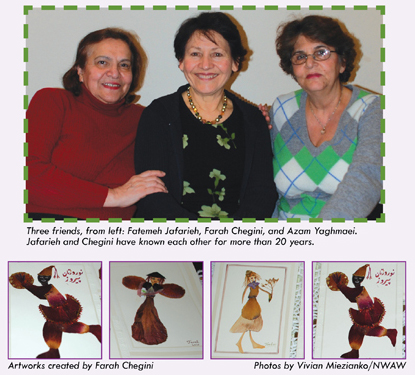By Vivian Miezianko
Northwest Asian Weekly

What comes to your mind when think of Iran?
Do you think of the home to the Persian civilization? Do you see news clips containing Iranian president Mahmoud Ahmadinejad and protesters in the streets? Does your mind conjure up images of women wearing black chador?
On the travel program “Rick Steves’ Iran,” Steves, the host, observes that Iranian men and women are segregated in places like buses and classrooms. According to the Lonely Planet guidebook, women make up 65 percent of the student body at universities. However, they constitute only 13 percent of the paid workforce.
What about a female Iranian émigré? No longer following the Sharia dress codes, she still speaks Persian and cooks Iranian food. While her life story may not be typical, can outsiders get a glimpse of her homeland’s social-cultural fabric and past turmoil reflected in her life?
Artworks created by Farah Chegini
A first-born girl grown up to be an independent woman
Farah Chegini, a mother of three grown children, was born in Tehran.
These days in America, she is surrounded by her friends, Fatemeh Jafarieh and Azam Yaghmaei, at Jafarieh’s house. Jafarieh was a busy and gracious host during the interview. She served tea, pistachios, fruits, and chocolate, and sometimes disappeared into the kitchen.
Chegini has three younger siblings, and her fondest memory ofserio her childhood is riding a tricycle.
“My father taught me,” she said, smiling.
She went to school and studied hard.
“My parents didn’t want us to watch TV or read magazines — nothing distracting [from our study]. They encouraged us to get a higher education all the time, [reminding] us to do our homework.”
Like nearly every Iranian, Chegini enjoys reciting poems. “Our culture [is reflected in] the poems,” she said.
“Yes,” her friend Yaghmaei affirmed.
When Chegini was a toddler, her mother, unintentionally, showed her what obligations were entailed in being a woman in their culture.
Artworks created by Farah Chegini
One day, Chegini watched her mother wash dishes and had an illuminating moment. Although she was only 3 and could hardly verbalize her thoughts, the image of her mother doing dishes struck her, and she wanted to help. She soon began helping her mother with house chores.
Chegini met her husband through her father, who had known her future husband well. Her father encouraged them to marry.
“He asked if he could talk to me personally first,” Chegini said, recounting one of her first conversations with her husband. “I told him, ‘I want higher education.’ He agreed, and we got married.”
The newlywed moved out of Tehran. Chegini did not proceed to go to a university because she had a child a year after she was married.
Three years later, she had her second child.
However, Chegini did not give up. When her oldest daughter was in the first grade, she enrolled in a translation college. Upon graduation, she taught English and took up translation work. Meanwhile, she and her husband discussed moving back to Tehran, as Chegini’s dream had not been fully realized.
“After a few years, I went to study at the National University in Tehran and earned a master’s degree in Teaching English as a Second Language.” The university was very selective about its applicants.
She took care of three children as she taught English.
In 1979, when the Islamic revolution broke out, all American teachers left Iran, so Chegini and other Iranian ESL teachers helped students prepare for the TOEFL test.
“My family was not [politically-involved], so we were fine.”
In 1984, during the Iran–Iraq war, her youngest child — her son — turned 17. Chegini said, “We didn’t want to send our son to war. We didn’t want to send him to the army.” So they sent their son abroad.
Chegini moved to the United States in 1989. When asked if she experienced culture shock, an unwavering “no” was her answer. With her face lighting up, she said, “I like it here a lot. My dream was to come to the United States. It was so great to have my degrees translated here.”
However, she could not follow her wish to study in an American college. “I have to work. I am the provider for my children.”
Chegini was hired by a daycare center during her first year here. By her second year, she attained a license and ran her own childcare business.
Now that all of her children have grown up and finished school, Chegini is happy and content. Her pastime is making exquisite cards and artworks that wow and delight her friends.
At the mention of the cards, Jafarieh quickly went into her room and dug out two cards that Chegini had given her.
“Still, I’d like to go to college,” Chegini said.
What will she study?
She did not pause for even a second. “Psychology, art, languages.”
Chegini and her Iranian friends miss their homeland very much. She makes Iranian food most of the time and often spends time with Jafarieh and Yaghmaei. The two women nodded in affirmation.
What is Chegini’s biggest dream?
“Peace in the world,” said Chegini earnestly, “especially in the Middle East.” ♦
For more information on Iran, visit www.lonelyplanet.com/iran.
Vivian Miezianko can be reached at info@nwasianweekly.com.



